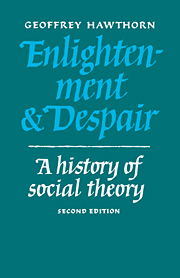Book contents
- Frontmatter
- Contents
- Preface
- Introduction
- 1 Enlightenment and doubt
- 2 History resolved by mind
- 3 History resolved by men
- 4 History resolved by laws I
- 5 History resolved by laws II
- 6 History resolved by laws III
- 7 History resolved by will
- 8 History doubted
- 9 History ignored
- 10 History unresolved
- Conclusion
- Bibliographies
- Index
Conclusion
Published online by Cambridge University Press: 18 September 2009
- Frontmatter
- Contents
- Preface
- Introduction
- 1 Enlightenment and doubt
- 2 History resolved by mind
- 3 History resolved by men
- 4 History resolved by laws I
- 5 History resolved by laws II
- 6 History resolved by laws III
- 7 History resolved by will
- 8 History doubted
- 9 History ignored
- 10 History unresolved
- Conclusion
- Bibliographies
- Index
Summary
To reconstruct the intentions of others, which is what I have tried to do in this history, presupposes the project in and for which these intentions were the intentions they were. Yet as Hegel said when he was preparing to publish his lectures on the Philosophy of Right, the Owl of Minerva flies only at dusk; the project is only clear when the reconstruction is done and the history completed. I began this history in supposing that there was something called ‘social theory’ which was as it was and had usually been presented. I conclude it by suggesting that the theory has not been so distinctive as even this vague and permissive description of it would imply; that in so far as it has been, it has finished, because it has failed; and that its failure reveals a fault in that larger project of which one can now see that it has been just one, relatively recent, part.
This is not to say that it has failed in what Aron decided was its ‘specific intention of a science of the social’. Aron's accounts of the more well-known social theorists are as sensitive and intelligent as any. And he was correct to suggest that for many of them, producing a science did matter. But this was never a first intention, and in many, it was quite absent. Montesquieu and Rousseau never had it.
- Type
- Chapter
- Information
- Enlightenment and DespairA History of Social Theory, pp. 254 - 275Publisher: Cambridge University PressPrint publication year: 1987

